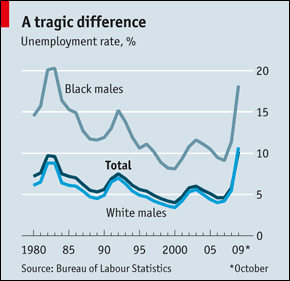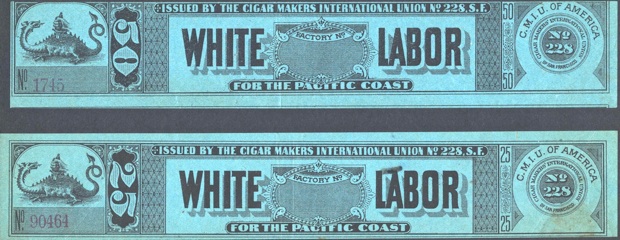Late 19th century union label.
Videos by Rare
Given slavery, the Civil War and Jim Crow, to take three horrifying data points and to state the obvious, we can see that racism has been a significant problem for blacks in America for most of our nation’s history.
If we were to speculate on the economic consequences of this persistent prejudice, it would be reasonable to predict high unemployment, job insecurity, and low wages for the affected group.
Reasonable, but only half right.
Up until the 1930s, the unemployment rate for blacks was lower than that for whites. In post-Civil Rights America we might expect employment among the races to be close to equal. Yet black unemployment in January of this year stands at 12.1%, almost double the national rate of 6.6%. Black youth-unemployment was a towering 393% higher than the national average in October.
What was so different about how the economy was structured that allowed unemployment among blacks and other minority groups to be lower than that of whites in the past? Perhaps the greatest contributing factor was “wage flexibility.”
Most employers, regardless of their personal prejudices will choose lower priced labor over higher priced labor. By offering to work for less than whites in certain industries in the past, blacks were able to grind out a living.
In 1908, journalist Ray Stannard Baker wrote that one of the most “significant things that I saw in the South — and I saw it everywhere –, was the way in which the white people were torn between their feeling of racial prejudice and their downright economic needs.” Two years after Baker made his observation, 71% of blacks over the age of nine were employed, as opposed to 51% for whites.
The status quo was far from ideal. The obvious downside is that while blacks enjoyed lower unemployment, they also suffered lower wages. Yet today blacks suffer both higher unemployment and lower wages than whites.
What changed? There’s an enormous amount of evidence to justify placing a measure of blame on two related culprits: government and labor unions.
Government interference comes in the form of minimum wage laws. While minimum wages negatively impact all low skilled workers who produce below the prevailing minimum wage, minorities are disproportionately impacted. A 10% minimum wage hike will decrease employment of white males by 2.5%, black males by 6.5%.
While this is an unintended consequence of the American minimum wage today, it was a very real intended consequence in its creation. Some proponents of the Davis-Bacon Act in 1931, which established the first federal minimum wage for workers employed in public works projects, argued that the law would curtail the overrepresentation of blacks in the construction industry.
They were right, it turns out.
Early labor unions in America has a similar train of thought. The American Federation of Labor’s first President, Samuel Gompers, declared that “Caucasians are not going to let their standard of living be destroyed by Negroes, Chinamen, Japs or any other.”
The main way racist unions would accomplish this is to prevent minorities from underbidding whites in the labor market by setting prevailing union wage rates that it would be illegal to work for less than. The International Brotherhood of Teamsters had other ways of excluding minorities from industry, which involved a complex seniority structure that aimed at promoting whites over minorities.
Some pro-union arguments hypothesize that unions would be beneficial to minorities since there’s an alleged inequality in bargaining power between races, but this argument falls to pieces if unions are excluding those they’re supposed to help.
This isn’t to say that all unions were discriminatory. The Knights of Labor were inclusive of minorities. And fortunately no U.S. union has explicitly racialist policies today.
Yet intentions don’t count for much in economics. Barack Obama is our first black president. Only a dolt would suggest he intends to harm young, low-skilled black workers when he proposes hiking the federal minimum wage. Yet that’s exactly what is going to happen if he prevails.
And union leaders today may not mean to hurt the job prospects of African Americans, but employers only have so much money. When they bid up the price of labor, employers will start rationing jobs.
The reduced stock of jobs is much less likely to go to people with worse education, fewer skills, less accumulated wealth or many of the other social problems that plague African Americans today.




